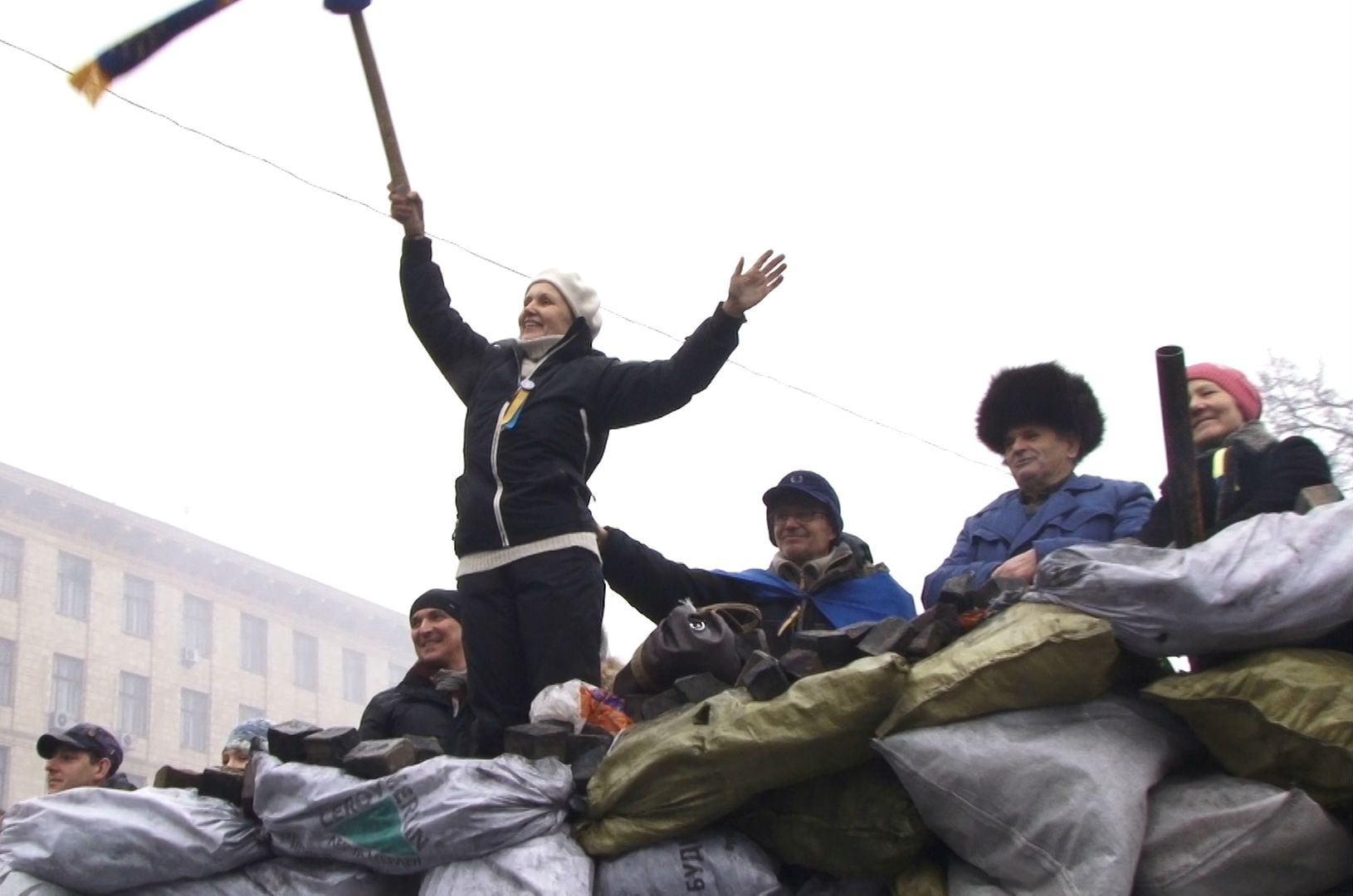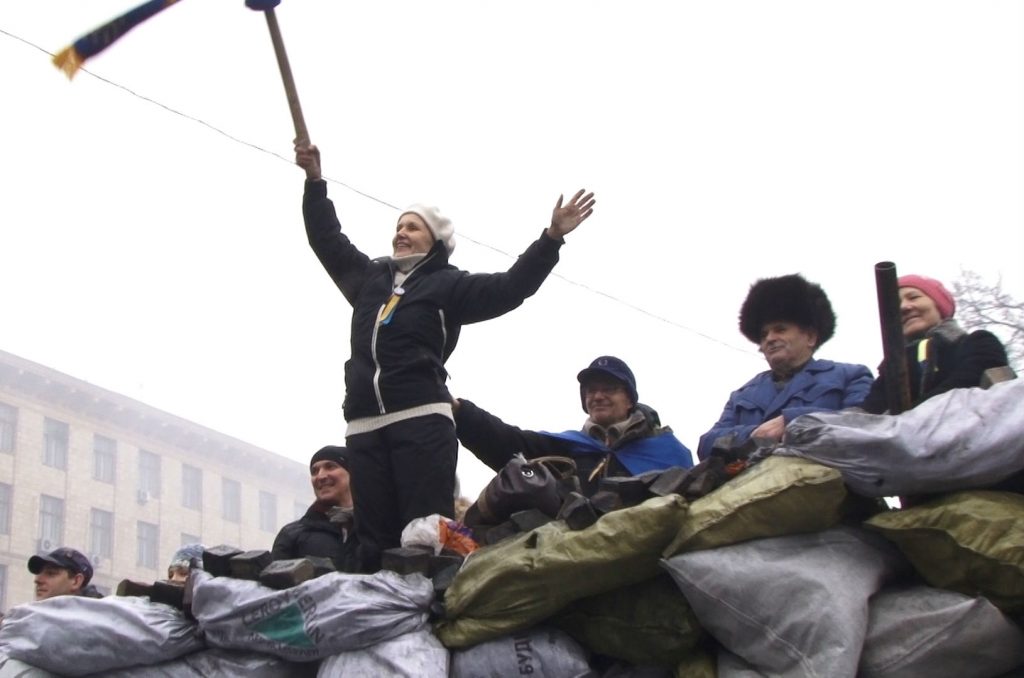 In China, women are poetically referred to as “half the sky.” During the most dangerous hours of Ukraine’s Revolution of Dignity, when tanks and water cannons and snipers were trained on protesters, roughly half of the Ukrainian activists were females of all ages.
In China, women are poetically referred to as “half the sky.” During the most dangerous hours of Ukraine’s Revolution of Dignity, when tanks and water cannons and snipers were trained on protesters, roughly half of the Ukrainian activists were females of all ages.
Now, the new film “Women of Maidan” beautifully portrays the critical role that females have played and continue to play in the Ukrainian struggle for democracy and freedom.
Created by US filmmaker Olha Onyshko and producer Petro Didula, the production documents the shift in attitudes and roles that took place during the Euromaidan. The emotions, empathy, and steely resolve of Ukrainian women are illuminated in wonderful and moving interviews and scenes that reveal the depth of the society’s desire for freedom.
The revolution was a turning point, which is why many documentaries have captured the courage of the crowd and the violence against it. It began in November 2013, when former President Victor Yanukovych opted out of an agreement to join Europe in favor of joining Russia. Spontaneous gatherings of students in Kyiv’s central square grew without changing the government’s trajectory. Then on November 30, 2013, police waded in with clubs and fists and shields, corralling the students in a tight, vulnerable circle.
“Girls, get behind us,” shouted a leader as the beatings created havoc and injuries. The mayhem was televised and inspired more to join the cause. And the girls didn’t stay behind the boys.
It sparked a national movement. One group of elderly women interviewed said they had come to Kyiv from the Carpathians to help “because they hurt our children.” These and other women marched, guarded barricades, and provided food, nursing help, supplies, and moral courage.
As the brutality increased, so did the support.
One woman said that being lied to by governments was one thing, but she became involved because “beating our children is another.” Another woman explained with pride that “they have destroyed our middle class, but we have raised our kids to be thinkers.”
The film—like the revolution—gave voice to females often left out or invisible in society. One woman articulated why such activism was necessary. “A mother crying at a crib is no use for her children if you want to stop a police state,” she said.
Groups of elderly women volunteered to hold “MAMA” signs and stand between the young police and demonstrators to stop Ukraine’s “children from killing one another.”
Commitment was pervasive even among those with the opportunity to seek greener pastures elsewhere. A beautiful former Miss Ukraine 2013 said bluntly, “If we retreat, it will be the end of us.”
Out of the bloodshed, this community grew. Thousands organized themselves into a small town complete with food, shelter, medical assistance, governance, and entertainment. Women doled out tea and soup from giant cauldrons for their fellow revolutionaries, and nurses ministered to the sick and injured in a makeshift hospital.
But the repression hardened and temperatures fell to minus 16 degrees Celsius. Still, undaunted, one businesswoman said in an interview that she came to the Maidan every morning to bring provisions and encourage those “freezing for our freedom” before going to work.
Leading the defiance onstage was Ukraine’s internationally known singer and Eurovision Song Contest winner, Ruslana, who performed despite receiving death threats. “Gang out,” she would chant between songs with the gigantic crowd night after night. Then on December 11, as government forces began encroaching on the Maidan with their weapons, she shouted from the stage, “Run to the churches, ring the bells—Kyiv, wake up!”
Weeks later, on February 19, the standoff worsened. Thousands of troops surrounded the Maidan. The next day, mass murder by sniper fire began, leaving 102 people dead, including two women, and hundreds wounded.
That outrage became the regime’s undoing. Processions of victims in caskets carried through the giant crowd were telecast across the country and the world.
So was the grief. The most poignant portion of the film involves a young girl, bereft and kneeling beside her dead boyfriend, and an older woman standing beside her. “I loved you,” sobbed the girl. And the woman, who did not know the victim, wept and said, “Forgive us, boy, for not saving you.”
By February 22, Yanukovych and his gang had fled to Russia. But the very next day, the invasion of Ukraine began: first Crimea, and then the Donbas. One woman commented on camera, “We overcame Yanukovych; now Putin too?”
Ever since, the women and girls of Ukraine have become fully engaged as soldiers, activists, volunteers, and politicians. And now, “Women of the Maidan” tells the story about how Ukraine’s females truly held up half the sky.
Diane Francis is a Senior Fellow at the Atlantic Council’s Dinu Patriciu Eurasia Center, Editor at Large with the National Post in Canada, a Distinguished Professor at Ryerson University’s Ted Rogers School of Management, and author of ten books.
Image: A woman waves a Ukrainian flag from the barricades in Kyiv, Ukraine, in early 2014. Credit: Olha Onyshko
